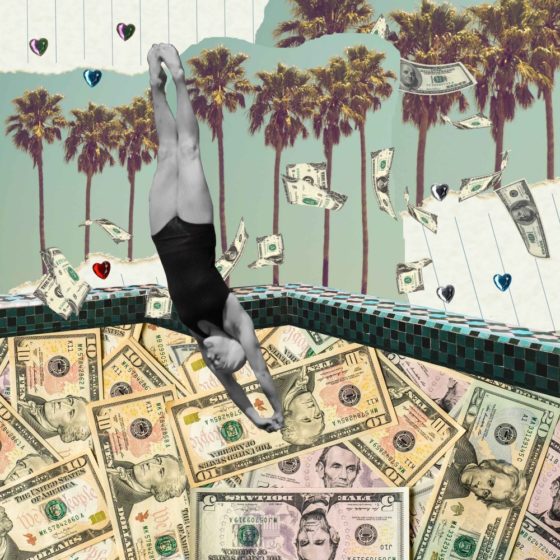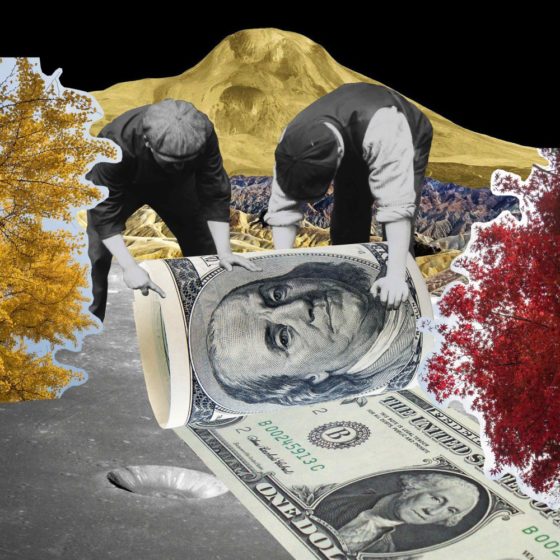The big D. One of the great pleasures of adulthood is finally getting to encounter it. It’s an experience that is not dissimilar to the ‘magic’ of getting your period for the first time, the whole affair shrouded in mystery. You aren’t quite sure what to expect, but you do know the experience will authenticate your foray into the swanky next stage of life. Then, not long after you get it, you’re crying, calling out for your mum and asking God for a refund.
Of course, I’m talking about debt. (Get your head out of the gutter).
Look, it’s safe to say that being in debt is not fun at the best of times, and absolutely devastating at its worst. But however bad it seems, there is always a way out – and believing you have the willpower and control to take the small steps needed to overcome it is step one in itself.
Borrowing money is often the only way for us to purchase the real expensive stuff of life, such as homes, cars and a fancy piece of paper that tells you you’re (kinda, but not really) smart. So it stands to reason that most of us will be in some form of debt over our lives. But while debt is a normal part of adulting, debt crises can arise quicker than you’d expect, with one person declared insolvent or bankrupt every four minutes and 17 seconds between last July and September in the UK. Crazy right?
It might seem like something that happens to other people, but debt is slippery. Imagine you’ve got rent, loans, all manner of bills and random monthly app purchases to pay off, and then you lose your job. Things can spiral real quick, and you can’t just bury your head in the sand in hopes that something changes, not least because it’s physically impossible to get sand out of your hair – the grains of Malaga 2011 still haunt me. So, in order to help you conquer the sinking sand of debt, we sourced some expert advice from Martha Lawton, ex-financial advisor, money management enthusiast and one half of the Squanderlust podcast, which talks about the emotional side of money. Read on for some clear and simple steps that’ll help you start tackling the big D.
Debt 4 Dummies: A Crash Course
Firstly, it’s important to lay down a layer of understanding of what debt is, how it thrives and the psychology behind it.
What is debt?
Put simply, debt is when you owe money to another party.
What are the most common types of debt?
Credit cards, medical debt (*snogs NHS*), student loans, personal loans, mortgages, mobile phone and utility bills, overdrafts, auto loans, payday loans… you catch my drift.
How do people get into debt?
According to Martha, “Most debt is caused by some kind of life event, like losing a job, getting sick, a relationship breaking up, an unexpected pregnancy, bereavement or having your hours cut at work.” Life happens, and sometimes that can cause serious financial strain. Contrary to popular belief, the primary cause of debt isn’t a frivolous brunch addiction. I was shocked too.
How does debt thrive?
Martha explains that the key psychological element that affects most people who are in debt is shame. “A lot of people feel really stupid for having got into debt, even if the reason was completely out of their control.”
We know how the conversation goes when we are being hard on ourselves. ‘I’m so stupid, I got myself into this. I’m to blame, and if I tell them, they’ll know I fucked up and they’ll worry. I made my bed, so I should lie in it and get myself out of this situation by myself.’
Sound familiar? Self-flagellation is a classic move. People don’t reach out for help because they don’t want to publicly own up to being in a shit situation, and are ashamed of it reflecting badly on them.
What is good debt and bad debt?
Good debt is when you borrow money that’ll increase your net worth – basically, borrowing money that’ll get you more money in the future. For example, taking out a business loan from the bank in order to start your inevitably successful skinny jeans for cats fashion line, Fierce Felines. That is good – no, great – debt.
Bad debt is borrowing money on depreciating assets, AKA, buying things with borrowed money that won’t get you more money. Activities such as buying a new car with a high interest loan, or using a credit card to get daily Deliveroos, clothes from Topshop and a Spotify account free from annoying adverts, might seem fun at the time, but they are a disaster waiting to happen.
We all buy those things once in a while, but borrowing money to maintain a lifestyle you can’t afford may just land you in even more debt. Better to buy those things with the riches from Fierce Felines.
What can debt lead to?
Obviously, debt is stressful, and with stress comes a whole host of physical and psychological problems, such as migraines, depression, anxiety and, in some extreme cases, heart complications. We don’t want that for you. So with the help of our resident expert, we’ve compiled three helpful tips to propel you on your debt-free journey.
Martha Lawton’s Three Steps for Navigating Debt
- Own up and forgive yourself
In the unlikely case that your debt was in fact caused by a flippant shopping habit, it still doesn’t help to shame yourself and entirely shoulder the burden of responsibility to fix it. “It’s not about what happened in the past, it’s about what can we do in the future to make this better,” says Martha.
The most responsible move when dealing with the psychological effect of debt is to accept it, own up to the part you played without self-debasement and, most importantly, forgive yourself. After which, it would be advisable to speak to loved ones candidly about your situation if you can. You might be surprised at how many people around you are also in debt and frightened.
- Go and Speak to a Debt Advisor. It’s Free.
If somebody threatened to sue you because you made a mistake, you’d get a solicitor. It should be no more shameful to go and talk to a debt advisor if you end up in debt. The only difference is that one costs you an arm and a leg and the other is free in the UK. After all, it’s a bit oxymoronic to add more debt to get someone out of debt.
The Citizens Advice Bureau in England and Wales dealt with 2,608 debt issues every day in November 2019, so you won’t be alone in seeking help, and there are significant solutions available to you that don’t involve declaring bankruptcy and living off bread and water. For example, you may receive six months of breathing space where you don’t have to make any repayments, which might just be enough time to get back on your feet. There are so many more possibilities, and the services to help you find them are there – utilise them! Click here to find available debt advice services.
- Self-Initiate Some Savings
If you’re not in a debt crisis, but want to start tackling the looming debts that you do have, here’s one helpful tip from Martha you can start to implement. Take a look at all the regular payments in your expenses – from gas, electricity and car insurance to that ridiculously pricey iPhone contract, cohort of Netflix/Prime/Hulu/Spotify/Hayu subscriptions, Candy Crush in-app purchases and credit cards – and ask yourself: Could I get this same thing cheaper? Do I even need it?
Now, you don’t have to do them all in one go and punish yourself with admin. But taking just one thing a month to investigate and possibly find a cheaper alternative for can make a huge difference – you may find each one saves you anywhere from £50 to £100, which really adds up.
The great thing about this tip is that once you’ve shifted on to a cheaper deal, it’s done. Dust your hands off, you don’t have to do this again for another year or so. Click here to listen to more on the ins and outs of debt on Squanderlust.
In short, while you can’t sugarcoat debt – it’s a shit situation to be in – you need to remember that no matter how deep you are in it, there are always steps you can take with the help of those around you.
And in the meantime, you can always make the big D your bitch for free entertainment. (Yep, I’m talking about dicks.).









